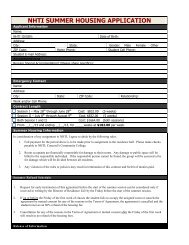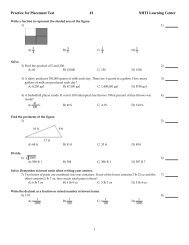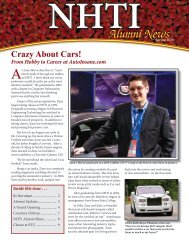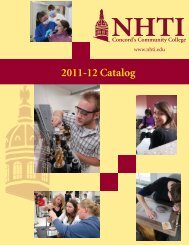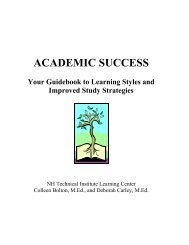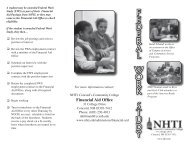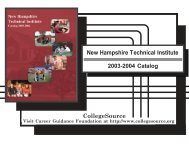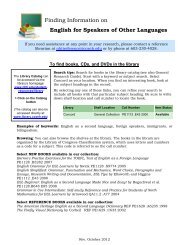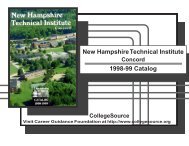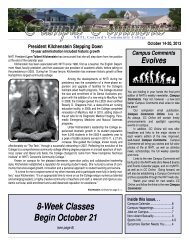Course Descriptions 11-12 - NHTI - Concord's Community College
Course Descriptions 11-12 - NHTI - Concord's Community College
Course Descriptions 11-12 - NHTI - Concord's Community College
- No tags were found...
Create successful ePaper yourself
Turn your PDF publications into a flip-book with our unique Google optimized e-Paper software.
elating to the student's goals for Practicum 2 in thestudent's classroom. (Co-requisite: EC 276)EC 275 Practicum 1 - Observation, Interpretation,Assessment and Portfolio Documentation 2-5-3Students will work in <strong>NHTI</strong>-approved ECE settings for childrenin infant/toddler care, preschool, or kindergarten under thesupervision of early childhood Cooperating Teachers.Students will conduct three (3) in-depth child studies overthe course of the 75 hours that they will spend at theirpracticum site during the semester. They will become"students of childhood" as they learn how to interpret andassess their observations of children in the seminar class.Students will create and manage portfolios for the childrenand use portfolio information to generate invitations tolearning and implement child-centered curriculum for thesechildren. They will make children's learning visible through"ordinary moment" documentations that also incorporatetheir own wonderings as teachers. Their observations will besummarized in narratives outlining the children's growth inthe various developmental domains. All of this will be used toplan and carry out a parent conference. <strong>NHTI</strong> ECE facultyschedule site visits to review and evaluate student progressduring the practicum experience. Students must earn a gradeof "C" or higher in Practicum 1 to move on to Practicum 2.(Prerequisites: all 100-level EC courses; a 2.5 minimum GPAin major field courses; permission of the ECE PracticumCoordinator; and submission of all required documents)EC 276 Practicum 2 - Student Teaching: ImplementingResponsive Emergent Curriculum (SRV) 2-10-5Students will work in <strong>NHTI</strong>-approved ECE settings for childrenin infant/toddler care, preschool, or kindergarten under thesupervision of early childhood Cooperating Teachers. Weeklyseminars conducted by <strong>NHTI</strong> faculty offer support forstudents and provide time to review the characteristics ofresponsive child-centered emergent curriculum that they areimplementing with children. Students will document andreflect on their experiences with children, families, andprofessional partners as they connect theory to practice.Students will also be encouraged to develop and embracethe dispositions of wonder, disequilibrium, and reflectivepractice as they experience the role of "teacher asresearcher" implementing the cycle of inquiry. The 150 hoursthey spend at their sites over the course of the semester willinclude lead teaching responsibilities. <strong>NHTI</strong> ECE facultyschedule site visits to review and evaluate student progressduring their practicum experience. Students must earn agrade of "C" or higher in Practicum 2 in order to graduatefrom the Early Childhood Education program. ServiceLearning is a component of this course. (Prerequisites: all 100level EC courses, EC 242, EC 265, and EC 275; a 2.5 GPA inmajor field courses, permission of the ECE PracticumCoordinator and submission of all required documents.)specialists. Students will divide their practicum hoursbetween a child care setting and a home setting.(Prerequisite: All other courses in the Autism EarlyIntervention Certificate with grades of “C” or higher)EC 288 The Early Childhood Professional (SRV) 3-0-3This course explores the role of the early childhoodprofessional in the workplace. Topics to be discussed includeleadership, working in a team, and professional ethics.Additionally, students will learn about the legislative processin NH and explore their role in advocating for public policy tosupport children, families, and early care and educationprograms. Students will develop a resume and create aprofessional portfolio that can be used for interviewpurposes. The portfolio will include competency statementswith supportive artifacts using the NAEYC Standards for EarlyChildhood Professional Preparation for Associate DegreePrograms. Emphasis will be placed on the role of ongoingprofessional development activities, and students will choosea professional development project to complete and share.Service Learning is a component of this course.(Prerequisites: all 100 level EC courses, EC 242, EC 270, EC275 and EC 265; may be taken concurrently with EC 276)EconomicsEO 101 Macroeconomics 3-0-3This course is concerned with the behavior of the economyas a whole, particularly fluctuations in economic activities.Basic elements of economic reasoning are applied to thepublic policy issues of unemployment, inflation, andeconomic growth. A brief survey of the history of economicideas is followed by a study of the consequences for nationalpolicy of the changing institutional structure of the U.S.economy, and of the conflicts inherent in, and generated by,competition and private enterprise. Analytic tools are used toevaluate monetary and fiscal policies and to understandcurrent macroeconomic controversies.EO 102 Microeconomics 3-0-3An investigation into the functioning and politics of the U.S.economy from the vantage of the marketplace, emphasizingmicroeconomics, wage bargaining, taxation and thedistribution of wealth and income. Topics include thetheories of demand and production, and the determinationof prices and quantities for commodities and factors ofproduction in competitive and noncompetitive markets.EducationTECP 70 - TECP 82 are professional preparation courses forTeacher Education Conversion Program candidates only.EC 278 Early Intervention Practicum 2-10-5This 150-hour field-based experience provides students witha supervised opportunity to develop skills and demonstratecompetencies necessary in early intervention in naturalsettings (child care, homes, public schools). Students willlearn how to best support families and caregivers.Supervisors will provide guidance and support needed toenhance students' development as early interventionED 101/TECP 50 Introduction to Exceptionalities 3-0-3This course introduces the various exceptionalities andrelated topics in the field of special education includingdefinitions, prevalence, assessment and intervention. Itincludes discussion of strategies for facilitating students'independence, learning, social connections and self-advocacyskills. Curriculum emphasizes the philosophical and practicalapplications of valuing students' abilities and diversity and8/17/20<strong>11</strong> <strong>NHTI</strong>, Concord’s <strong>Community</strong> <strong>College</strong> <strong>Course</strong> <strong>Descriptions</strong> 20<strong>11</strong>-20<strong>12</strong> 20



